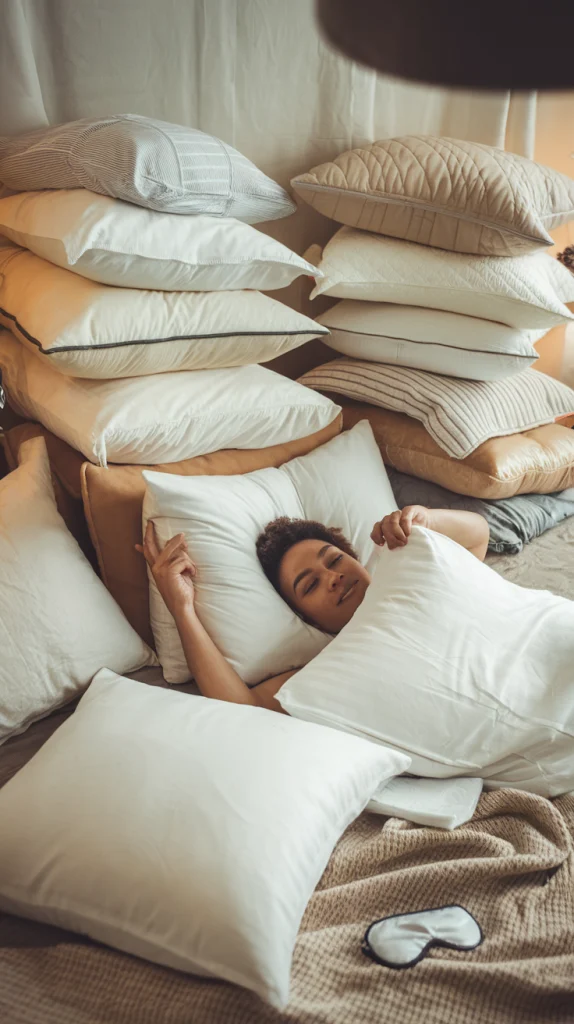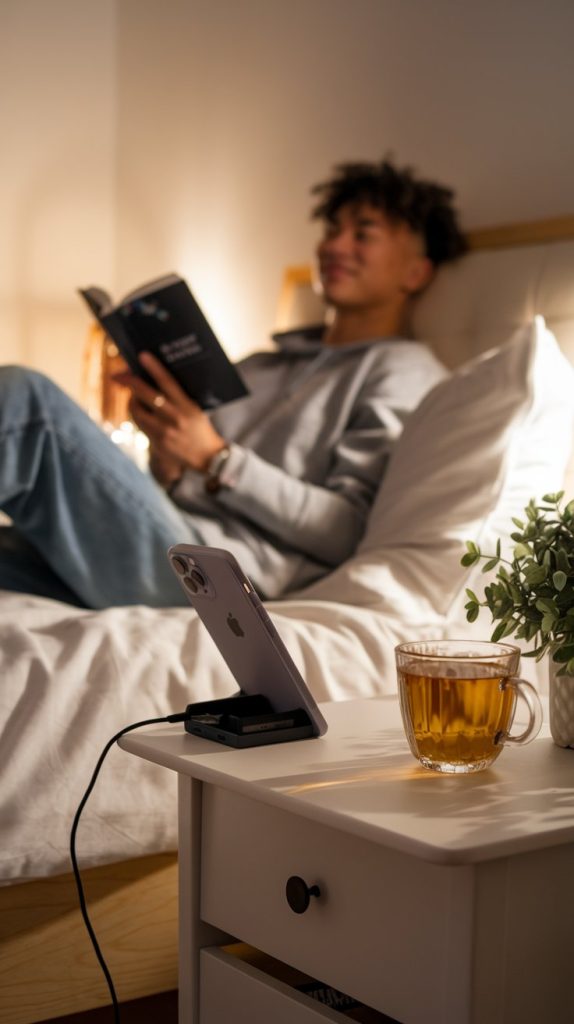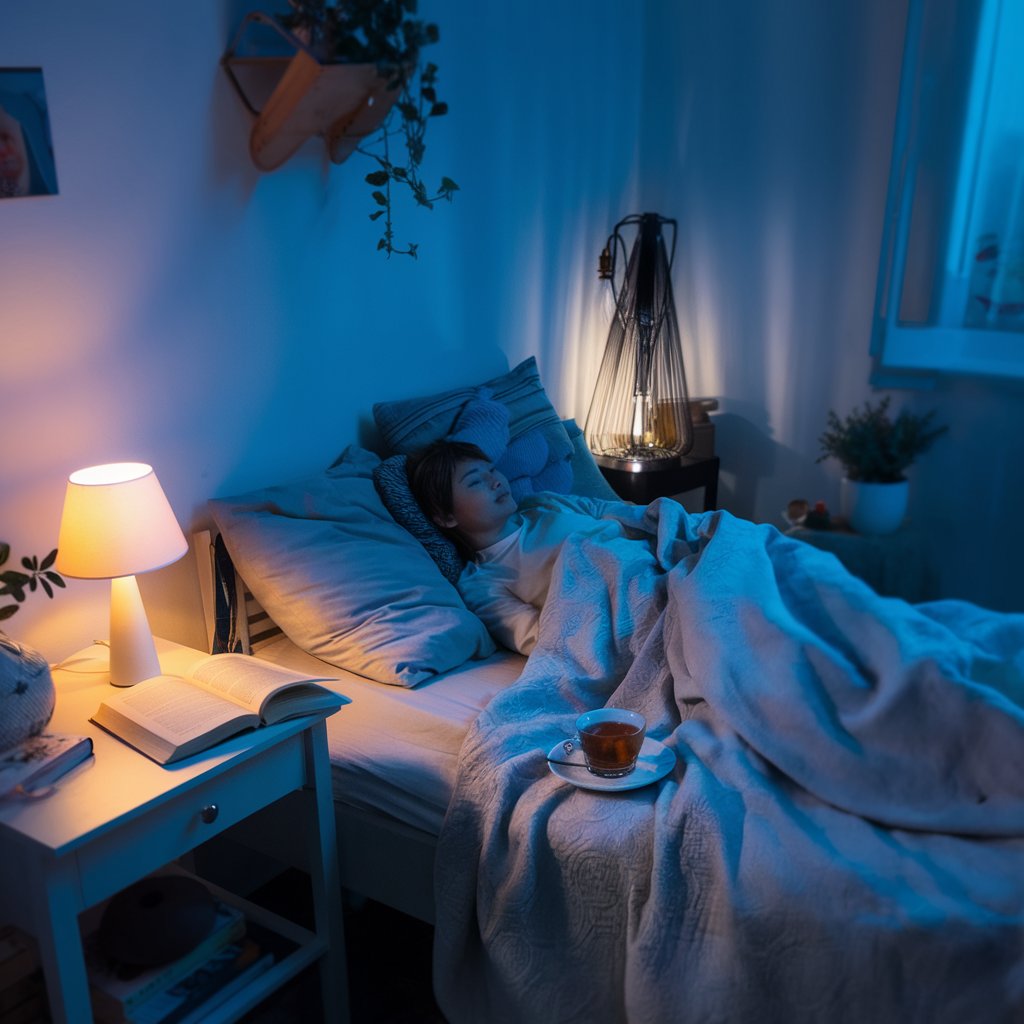As you lie in bed, your restless mind racing like a runaway train, you’re desperate to find the brakes that will bring it to a halt. You’ve tried counting sheep, but they’re just not cutting it. The truth is, falling asleep fast is an art that requires a delicate balance of preparation and relaxation. By fine-tuning your bedtime routine and creating a sleep-conducive environment, you can quiet your mind and calm your body. But what exactly does that entail?
Create a Bedtime Routine
As the clock ticks closer to bedtime, your body starts to wind down, signaling that it’s time to prepare for a restful night’s sleep.
A consistent bedtime routine helps your brain associate certain activities with sleep, making it easier to drift off. Begin by setting a specific bedtime and sticking to it, even on weekends.
Then, create a calming pre-sleep sequence: dim the lights, lower the thermostat, and silence any loud noises. Next, engage in relaxing activities like reading a book, listening to soothing music, or practicing gentle stretches.
Did you know that a healthy liver function can also contribute to a good night’s sleep? Liver Purification Complex can help optimize your liver function, leading to better energy and metabolism.
Avoid stimulating activities like watching TV or scrolling through your phone, as they can interfere with your sleep.
As you wind down, your body will start to relax, and your mind will clear, preparing you for a deep and rejuvenating sleep. By establishing a bedtime routine, you’ll be well on your way to falling asleep fast and waking up feeling refreshed and revitalized.
Relax With Deep Breathing

Now that you’ve established a calming bedtime routine, the time has come to focus on relaxing your body and mind further.
Deep breathing is a powerful tool to calm your nervous system and prepare your body for sleep. Find a comfortable seated or lying position, close your eyes, and take slow, deliberate breaths in through your nose and out through your mouth.
Feel the air fill your lungs, and then release it, letting go of any tension or stress. As many people struggle with slow metabolism, which can affect their general energy and well-being boosting metabolism, creating a relaxing environment that promotes a restful sleep is vital.
Try inhaling for a count of four, holding for a count of seven, and exhaling for a count of eight. Repeat this process several times, focusing on the sensation of the breath moving in and out of your body.
As you breathe, imagine any worries or concerns leaving your body, making room for a restful and rejuvenating sleep. With each breath, feel your body relax, your mind quiet, and your entire being surrender to the present moment.
Get Comfortable With Pillows

Serene slumber beckons, but initially, creating a comfortable haven for your head and neck is crucial.
You’ll want to choose a pillow that provides the right amount of support and comfort for your unique sleeping style. Reducing belly fat can also improve general health and reduce mortality risk, and a good night’s sleep is necessary for that.
If you’re a side sleeper, look for a thicker pillow to cushion your pressure points. Back sleepers, on the other hand, will benefit from a thinner pillow that keeps their spine aligned. Stomach sleepers, you’ll want a soft, thin pillow or even no pillow at all to keep your head in a neutral position.
Experiment with different pillow types, like down, memory foam, or hybrid pillows, to find what works best for you. Consider the fill power, loft, and material to guarantee you’re getting the right level of support and comfort.
Don’t be afraid to try out a few options until you find the perfect pillow that cradles your head and neck in comfort. With the right pillow, you’ll be well on your way to a restful night’s sleep.
Limit Exposure to Screens

Screen time saboteur: your bedtime routine’s worst enemy.
You know the drill – you’re lying in bed, scrolling through your phone, and before you know it, an hour’s gone by and you’re wide awake.
The blue light emitted from screens suppresses melatonin production, making it harder for you to fall asleep.
Did you know that scientists have unearthed a new cause of stubborn belly fat: lack of quality sleep sumatra slim belly tonic?
It’s time to take control and set some boundaries.
Try to avoid screens for at least an hour before bedtime or use blue light filtering glasses, apps, or software.
Instead, opt for a relaxing activity like reading or meditation to calm your mind.
Make your bedroom a screen-free zone, and charge your devices in another room.
By doing so, you’ll create a sleep-conducive environment that signals to your brain that it’s time to wind down.
Cool Down Your Body
Your body’s internal thermostat plays a significant role in falling asleep fast. When your body temperature drops, it signals to your brain that it’s time to sleep.
You can take advantage of this natural process by cooling down your body before bed. Take a warm bath or shower, then let your body cool down naturally. This sudden drop in temperature will help trigger your body’s sleep response.
You can also try wearing light, breathable pajamas to keep your body cool while you sleep. Avoid wearing heavy blankets or thick comforters that can trap heat and make you feel hot and uncomfortable.
Keep your bedroom cool by setting the thermostat between 60-67 degrees Fahrenheit, the ideal temperature range for sleep. By keeping your body cool, you’ll be able to fall asleep faster and sleep more soundly throughout the night. A cooler body temperature can also improve the quality of your sleep, helping you wake up feeling refreshed and energized.
Use White Noise Effectively
As you work to create an ideal sleep environment, don’t underestimate the power of sound.
White noise, in particular, can be a game-changer. It’s like a warm blanket for your ears, blocking out distracting sounds that keep you awake. You can use a white noise machine, or even a fan, to create a soothing background hum.
Imagine yourself drifting off to sleep, surrounded by the gentle whoosh of ocean waves or the soft patter of raindrops on the roof.
Experiment with different sounds to find what works best for you. Some people love the sound of rustling leaves or buzzing bees, while others prefer the constant thrum of a train or airplane.
You can even create your own custom soundscapes using apps or online tools. Whatever you choose, make sure it’s consistent and calming. Aim for a volume that’s loud enough to mask any background noise, but not so loud it’s jarring.
With the right white noise, you’ll be sleeping like a baby in no time.
Practice Mindfulness Meditation
Mindfulness meditation is a potent sleep aid, and it’s easier to practice than you might think.
By dedicating just a few minutes each day to mindfulness meditation, you can quiet your mind, calm your body, and prepare yourself for a restful night’s sleep.
Start by finding a comfortable seated or lying position, then close your eyes and focus on your breath.
When your mind wanders (and it will!), gently bring your attention back to your breath without judgment.
As you meditate, imagine any tension or stress leaving your body with each exhale.
As you practice mindfulness meditation, you’ll become more attuned to your body’s natural sleepiness cues.
You’ll learn to recognize the subtle signs that it’s time to wind down and prepare for bed.
Regular mindfulness practice can also help reduce anxiety and depression, common sleep disruptors.
By incorporating mindfulness meditation into your daily routine, you’ll be sleeping better in no time.
Frequently Asked Questions
Can I Fall Asleep Fast With a Full Stomach?
You’re wondering if a full stomach will help you doze off quickly. Unfortunately, it’s not that simple. Eating a large meal before bed can actually disrupt your sleep, making it harder to fall asleep and reducing quality sleep.
How Long Does It Take to Develop a Sleep Routine?
You’ll find that establishing a consistent sleep routine takes around 2-4 weeks, as your body adjusts to the new patterns and habits you’re creating. Crucial to stick to your routine, even on weekends, to make it a lasting habit.
Can I Use Earplugs Instead of White Noise?
You’re wondering if earplugs can replace white noise for better sleep. Yes, you can use earplugs as a substitute, but they might not be as effective, and it’s crucial to select the right type to guarantee a safe and comfortable sleeping experience.
Is It Okay to Sleep on My Stomach?
When in a pickle, you prefer sleeping on your stomach, but beware: it can put pressure on your spine and joints, making it a recipe for discomfort and pain; consider alternatives to avoid waking up feeling stiff and sore.
Can I Nap During the Day and Still Sleep Well?
You can nap during the day, but be mindful of the timing and duration to avoid disrupting your nighttime sleep. Keep naps under 30 minutes and before 3-4 pm to guarantee you’ll still sleep well at night.
Conclusion
By incorporating these techniques into your nightly routine, you’ll be sleeping like a baby in no time! For instance, Sarah, a busy entrepreneur, struggled with insomnia for years until she started practicing deep breathing exercises and ditching her phone an hour before bed. Now, she drifts off to dreamland within 15 minutes and wakes up feeling revitalized and ready to tackle the day. With these simple yet effective strategies, you can say goodbye to restless nights and hello to a refreshed, energized you!










